Trading Day: ASX gains in rush of results
A barrage of results has dominated market moves, with Qantas and Coles boosted despite profit slips while Coke hit a 5-year high.
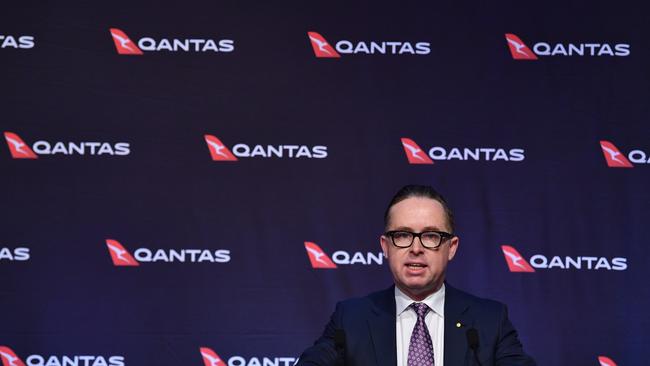
- Ruralco, Nutrien get ACCC green light
- Slow demand, fuel costs drain Qantas
- Coles posts 3rd straight earnings slide
- Origin profit jumps fivefold
- Fed stays flexible on rates
That’s it for the Trading Day blog for Thursday, August 22. Australian stocks finished higher in the busiest day on the earnings calendar. Qantas investors were torn between a profit drop but $400m buy back, but finished higher while Coca-Cola Amatil, Nine and Coles edged up on strong results. Other reporters inclue Origin, Santos, Perpetual, Scentre and South32, among many others.
Bridget Carter 4.59pm: Gold Fields sells out of Gold Road
Dataroom | Gold Fields is selling out of Gold Road Resources, offloading its 9.9 per cent stake through Macquarie Capital.
The 87.1 million shares are being sold at a floor price of $1.45 per share, equating to $126 million.
The final price of the trade will be determined through a book build.
The floor price of $1.45 per share represents a 7.9 per cent discount to the stock’s last close of $1.575.
Gold Fields says it will use the funds to reduce its debt.
“Gold Fields’ investment in Gold Road has been successful. However, as a minority equity interest, it is not a core holding for Gold Fields,” the company said in a term sheet sent to investors.
It added that it remained committed to its 50 per cent interest in and operatorship of the Gruyere joint venture with Gold Road.
4.36pm: How reporting companies finished up
The local market pulled back in late trade, finishing the session up just 0.3 per cent to 6501.8 after gaining as much as 0.58 per cent early in the session.
Here’s how key reporting companies fared at the close:
- Qantas added 1.38 per cent to $5.86 after profit slipped by 17pc while announcing a $400m buyback
- Coles finished up 2.12 per cent to $13.52 after a sales and profit slip, investors instead focussing on its special dividend
- Medibank added 2.96 per cent to $3.48 as it increased its profit and announced a special dividend
- Nine Entertainment gained 8 per cent to $1.95 after the merger with Fairfax helped its bottom line
- Coca-Cola Amatil closed up 5.84 per cent to a five-year high of $11.05 despite a slip in Australian beverage sales as it declared a special dividend from the proceeds of its SPC sale
- Origin closed 2.36 per cent higher to $7.37 on surging profits
- Santos added 3.5 per cent to $7.10 after trippling interim profit as LNG prices continue to climb
- Perpetual took a 1.18 per cent hit to $35.94, warning its value strategy was hurting its results
- Webjet was the worst performer on the benchmark, after flagging uncertainties due to the US-China trade war and Brexit. Shares wound back by 8.3 per cent to $12.70
- South32 lost 4.36 per cent to $2.63 flagging the sale of its coal arm
- Scentre Group gained 1.3 per cent to $3.90, fighting back from an early drop as the mall-owner feels the amazon effect
4.18pm: Stocks trim gains in late slip
The local market has trimmed its gains in the final hour, but finished a choppy session higher with results squarely in focus.
At the close of trade, the benchmark ASX200 was up 18 points or 0.3 per cent at 6501.8 while the All Ordinaries edged up 20 points or 0.3 per cent to 6593.
Cliona O’Dowd 3.35pm: Gonski details ANZ failures
A focus on short-term fixes, a lack of accountability and a conditioned acceptance that it’s “all too hard” or “the way it’s always been” are just some of the ways ANZ Bank has failed its customers, chairman David Gonski has admitted.
In a statement released to the market today, Mr Gonski revealed the extent of the bank’s failings as exposed by the cultural and governance self-assessment it submitted to the banking regulator last year.
“We found a compliant culture with strong loyalty to teams — often at the expense of the broader group. There was also a greater focus on short-term fixes and what it meant to be ‘customer-centric’ lacked clarity and structure.
“Accountability for outcomes across ANZ, particularly in relation to inaction or poor performance, often lacked clarity below the senior executive level,” Mr Gonski said.
ANZ shares last up 1.06pc to $26.65.
Sarah-Jane Tasker 3.27pm: Medibank queries ‘unusual’ device rise
The head of Australia’s largest health insurer has called for a deep dive into the “unusual” rise in medical device use in the private sector as he calls for further reforms to address affordability.
Craig Drummond, chief executive of Medibank, said today that the insurer had not seen the total dollar amount of the benefit it passed onto customers - via lower annual premiums - post previous reforms to reduce the cost of medical devices.
Insurers had previously agreed to pass onto consumers the full benefit of savings from cuts to prices on some items on the Prostheses List, which determines what funds must pay for medical devices.
New private health insurance stats out this week from the financial regulator showed that there was an 8.6 per cent growth in claims cost for medical devices over the last year, against hospital claims, which were stable at 0.3 per cent.
“For some bizarre reason, volumes have accelerated quite sharply in prostheses,” Mr Drummond said.
“It is something that needs to be looked at as it seems unusual when broad hospital utilisation rates are low, we are seeing a sharp escalation in volumes of medical devices.
“We will pay for the right care if our customers need it but there needs to be a hard look at what is happening here because it does not feel right.”
Ben Wilmot 3.16pm: Event needs more blockbusters
Listed entertainment, hospitality and leisure operator EVENT Hospitality & Entertainment Limited has unveiled a 2 per cent bump up in revenue from its continuing operations to almost $1 billion after almost closing out the sale of its German cinema business.
The company, chaired by billionaire Alan Rydge, says its winning share in the movie market but has been hampered by the lack of blockbuster and action adventure films during the year.
Titles that grossed over $30 million at the Australian box office last year included Avengers: Endgame ($83.9m); Bohemian Rhapsody ($55m); Aquaman ($41.7m); Captain Marvel ($41.6m); A Star Is Born ($36.5m); and Aladdin ($30.9m).
The company which made $998m from its continuing operations is also advancing two major Sydney property developments - a landmark scheme on its site the corner of Market and George Street to extend the QT Sydney hotel and build an office tower, and an overall of the nearby cinema complex that would include a new Atura hotel and luxury apartments.
The group’s normalised profit after tax from its ongoing operations fell by 6.7 per cent to $104.3m as it dealt with having fewer film hits and overall net profit after tax, including the German unit, was flat at $111.9m.

2.48pm: Flight Centre, Vocus gain double digits
Household names like Flight Centre and Vocus are racking up more than 10 per cent gains in afternoon trade, as results beat market expectations.
Imaging group Pro Medicus, led by rich-listers Sam Hupert and Anthony Hall, is leading the market with a 15.7pc gain after a 92pc profit boost, while Vocus is up 10.1pc to $3.22 on its turnaround progress.
Flight Centre shares are just shy of double digits, up 9.24 per cent to $47.89 but touching as much as $48.59 on its strong outlook.
On the contrary, fellow travel group Webjet is off by 11.5pc to $12.26 despite a jump in profits.
ASX200 last up 25 points or 0.4pc to 6508.5.
2.01pm: ASIC cracks down on risky derivatives
Australia’s fast-growing retail derivatives sector faces a crackdown by the Australian Securities and Investments Commission after the regulator found that most clients who trade so-called binary options and contracts for difference lose money.
In what may be the first use of its new product intervention powers, ASIC has proposed a complete ban on the sale of binary options to retail clients and restrictions on sale of CFDs, pending the outcome of a six-week consultation period with stakeholders.
It comes after ASIC found that “retail investors have suffered, and are likely in future to suffer, significant detriment from binary options and CFDs”, with a 2017 review finding that 80 per cent of clients who trade binary options lose money and 72 per cent of clients who trade CFDs lost money.
“For many years ASIC has taken strong action to protect consumers of binary options and CFDs, using the range of regulatory tools available to us,” said ASIC Commissioner Cathie Armour said.
1.38pm: Aussie PMI takes trade war hit: CBA
Australia’s services sector has slipped for the first time since March, as Australia gets “caught” in the US-China trade war, according to the Commonwealth Bank.
The bank’s early PMI read showed a decline in private sector output for August, to 49.5 from 52.1 in July - where readings below 50 signal a deterioration in business activity.
“A persistent concern is that the fallout from the US-China trade war will dent global capex and consumer spending as cautious businesses and households retreat to the sidelines,” CBA chief economist Michael Blythe says.
“The shift back into contractionary territory in the CBA Flash PMI reading for August indicates that Australia is not immune to these global risks.”
Perry Williams 1.34pm: ERM Power baron in $170m winfall
Power baron Trevor St Baker will land a $170 million windfall after global energy giant Royal Dutch Shell swooped on Brisbane-based electricity operator ERM Power in a $617 million deal, handing the company’s founder and biggest shareholder a bumper payday.
Shell has proposed to pay ERM $2.465 per share - a 43 per cent premium - in a scheme of implementation deal that signals its intentions to challenge the big three Australian power incumbents: AGL Energy, Origin Energy and EnergyAustralia.
ERM shares surged as much as 45 per cent or 78c to $2.50 in early trade.
ERM directors and Mr St Baker - who owns a 27.5 per cent stake in the company - have both recommended the deal.
“I intend to vote my shares in ERM Power in favour of the scheme, in the absence of a superior proposal and subject to the independent expert concluding this is in the best interests of ERM Power shareholders,” Mr St Baker said in a statement.
For the 79-year old Mr St Baker it marks another impressive deal in the industry and underlines the attractiveness of ERM’s deep connections with big industrial and commercial customers.
The veteran deal-maker is best known recently for his audacious deal to pay just $1m to the NSW government to buy the Vales Point coal power plant in 2015, conducted through a separate business entity called Sunset Power, and which has since delivered bumper dividends on surging power prices.
ERM Power shares last traded up 42.44pc to $2.45, just shy of the offer price.
Sarah-Jane Tasker 1.30pm: Analysts trim Crown as VIPs slow
The James Packer-backed Crown Resorts has had a trim to its price target by analysts, cautious on the outlook for VIP customers.
JP Morgan updated its view on the casino company following the release of its annual results yesterday and cut its price target on Crown from $12 to $11.75.
Shares in Crown are down just under 1pc today at $11.47.
“The Australian VIP market recovery has potentially stalled and Crown has lost share to (rival) Star as the (Sydney) Barangaroo business case remains in question,” JP Morgan said in a note on Crown.
“A renewed focus on core land-based casino operations without balance sheet pressure is attractive, although headwinds in Perth remain and Asian tourism to Crown faces emerging softness.”
JP Morgan added that questions would likely persist around the future of Australia-wide VIP business and specifically the domestic business case for the Barangaroo project in Sydney.
UBS said post the results that it remained cautious on VIP and expected another 25 per cent decline in that business in fiscal 2020.
The analysts at Macquarie outlined that they continued to remain cautious on VIP given ongoing trade tension between China and the US and the recent reports on a major junket operator used by Crown.
“As such, we forecast VIP to decline by 11 per cent,” the analysts said.
1.19pm: APA erases gains as valuation stretches
APA Group has given back all of yesterday’s gains after its results, as Macquarie warned valuations across the sector were stretched.
Yesterday, the group’s announced earnings at the top end of its guidance, saying it was on the hunt for major US acquisitions.
Its shares finished the sesion up 3pc, but those gains have been completely erased today as brokers trim their targets and recommendations on the stock.
Macquarie says the recent movement in the stock, and the wider sector, was down to bond rates and the US expansion creates some uncertaintly.
“US expansion and management’s structural change supporting it increases the likelihood of a first move into the US in the coming 12 months,” the broker says.
“Issue is to find the right-sized distribution/transmission asset that offers incremental growth opportunities.”
Macquarie and Morgans trimmed their price target for the stock by 2.7pc to $11.24 and $10.64 respectively, while Citi raised its target by 3pc to $11.18 and Morgan Stanley by 3.1pc to $11.22.
APA shares last down 3pc to $10.82.
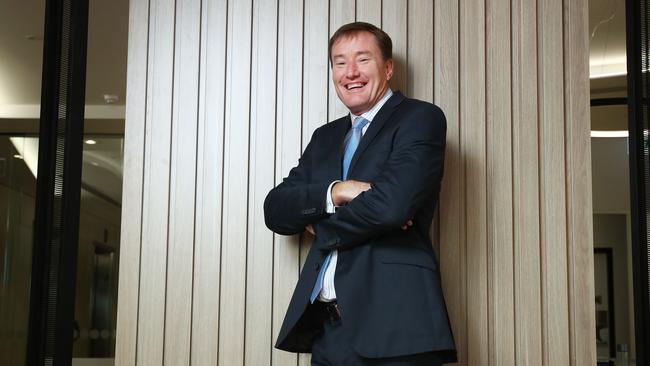
Andrew White 1.11pm: Perpetual on international M&A hunt
Perpetual chief executive Rob Adams has declared an acquisition of international funds management capabilities priority number one as he looks to reverse continuing outflows and seize a once in a generation opportunity to expand its advice business.
Mr Adam, who has taken on the role of chief investment officer, has appointed a dedicated executive to hunt acquisitions that would diversify the struggling company away from its domestic, value style of investing.
Perpetual has $200 million in cash to spend and would consider borrowings and a capital raising to fund the acqusition. Mr Adam said the firm had already come close to a number of acquisitions since he joined in September last year but was unable to strike a deal.
His comments came as Perpetual reported a 17 per cent drop in annual net profit to $115.9 million, hurt by fund outflows and lower performance fees in what was labelled a difficult market.
Average funds under management fell to $27.1 billion, down from $30.8 billion a year earlier and $32.8 billion in 2016-17.
PPT shares last down 0.88pc to $36.05 after touching $34.79 earlier in the session.
Supratim Adhikari 1.08pm: Life360 simplifies ahead of regulation
ASX-listed family networking app Life360 is simplifying its terms and conditions to users, with company CEO Chris Hull keen to pre-empt any fallout from the recent surge in regulation.
The company is creating a portal on its app that spells out its data collection practices and how its uses customer information.
Mr Hull told The Australian the company has been keeping an eye on the ACCC’s digital platforms report and stricter regulatory oversight means that technology companies have to make consumer privacy and data rights central to their operations.
“We have been looking at it at a top level and if you look at things broadly there’s clearly a push for greater privacy and data regulation at a global level.”
“Our terms and conditions and privacy policy already has all of that information but I understand why some users say that it’s all fine print,” he said.
Mr Hull’s comments come as Life360 posted a net loss of $US17.1 million ($25.2m) for the six months ending June 30, compared to the net loss of $US7.5m ($11.1m) recorded in the comparable period in full year 2018
John Stensholt 12.46pm: Pro Medicus execs rejoice at results
The share wealth of Pro Medicus executives and major shareholders Sam Hupert and Anthony Hall has surged by a combined $200 million this morning after the pair delivered a strong profit result for the medical technology company.
Pro Medicus shares were up almost 16 per cent at lunch, after the company said it made a record net profit of $19.9 million, up 91 per cent from last year, and that revenue had increased 47.9 per cent to $50.1 million.
The company’s products include technology that allows radiologists to view and manipulate large and complex medical images and radiology practice management software.
Mr Hupert, the company’s chief executive, told the market that sales in North America had been particularly strong.
Pro Medicus will pay a full franked 4.5c per share final dividend
Both Mr Hupert and Mr Hall are members of The List - Australia’s Richest 250. Their respective 30 per cent stakes in Pro Medicus are now worth about $900 million.
Pro Medicus shares have increased by 177 per cent since January 1 and its market capitalisation is now more than $3 billion.
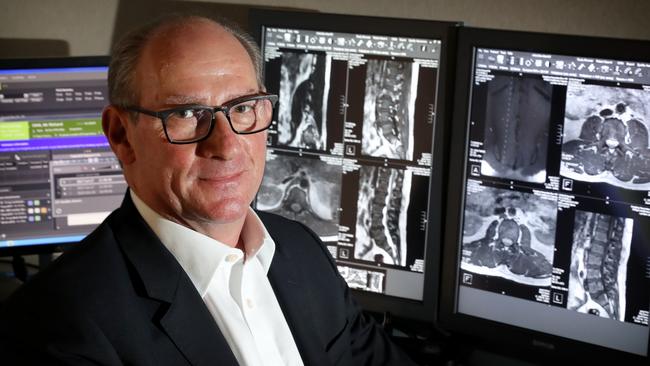
Lilly Vitorovich 12.45pm: Nine turns to Stan, digital for growth
Nine Entertainment is facing cost and advertising headwinds, as the media company turns to its streaming business Stan and digital operations for earnings growth.
The group, which merged with Fairfax Media in December, has forecast its sporting coverage will drive up the costs of its television operations, as it reported a mixed full year earnings performance.
Nine said its TV costs are set to increase by around 4 per cent during the current financial year, due to contracted sports rights inflation of around $27m, and incremental costs of about $15m associated with The Ashes and World Cup Cricket.
Weak market conditions in July will result in a 4 per cent fall in Nine’s free-to-air revenue in the first quarter, however the company expects conditions to improve into the second quarter of the 2020 financial year.
Over the year, Nine expects the free-to-air market to fall by “low single digits, partially offset by growth of at least 1 revenue share point”, the company said in a statement to the ASX.
Nine shares were up 6.4 per cent to $1.92 at lunch time on the ASX.
12.27pm: Leaders and laggards at lunch
The local market is holding higher at lunch, amid an avalanche of results, with investors largely focussing on payouts over the bottom line.
The benchmark ASX200 is higher by 30 points or 0.47 per cent to 6513.6.
Take a look at the companies leading the market:
- Imaging group Pro Medicus is higher by 13.82pc to $29.97 after delivering a bumper 92 per cent lift to profits for the year
- Flight Centre is up 10.21pc to $48.32 as earnings from its overseas business overtook domestic operations
- Vocus is trading 9.76pc higher to $3.20, after flagging progress in its three year turnaround plans
- oOh!media has bounced by 8.6pc to $2.91 after heavy selling earlier in the week when it issued a profit warning
- Costa Group is higher by 7.67pc to $3.79
Meanwhile, the biggest drags on the market:
- IDP Education is shedding 21pc to $15.46 after earnings from its core Australasian region slipped amid strong competition
- Webjet is losing 11.2pc to $12.30 as it flagged uncertainties ahead due to the trade war and Brexit
- Bingo Industries is pulling back by 5.38pc to $7.29 despite posting strong profits after its DADI acquisition
- Iluka Resources has extended yesterday’s drop, down 5.38pc to $7.29 today after weak results yesterday
- St Barbara is dragging by 5.4pc to $3.34 as safe haven stocks slip out of favour
Samantha Bailey 12.17pm: Lovisa rises amid speedy store rollout
Accessories retailer Lovisa has touted an ongoing improvement in trading for the first start of the new financial year, as it unveiled a 3 per cent lift in annual after tax profit and upped its final dividend.
For the full-year through June 30, Lovisa said revenue had lifted 15.3 per cent to $250.28m following the opening of 64 new stores globally.
“We are pleased that we have been able to continue the momentum of our store rollout through to the second half which has again delivered us strong top line sales growth despite more challenging trading conditions, particularly in the first half, which contributed to negative comparable store sales for the year,” managing director Shane Fallscheer said.
“The company has been able to continue to invest into the operational structures to support our global expansion ahead of the growth curve while still continuing to deliver profit growth, and pleasingly we have seen improved comparable store sales in the second half of fiscal year 2019 and early in fiscal year 2020.”
Shares in the company were buoyed on the news and were trading 4 per cent higher at $12.56 each at midday (AEST).
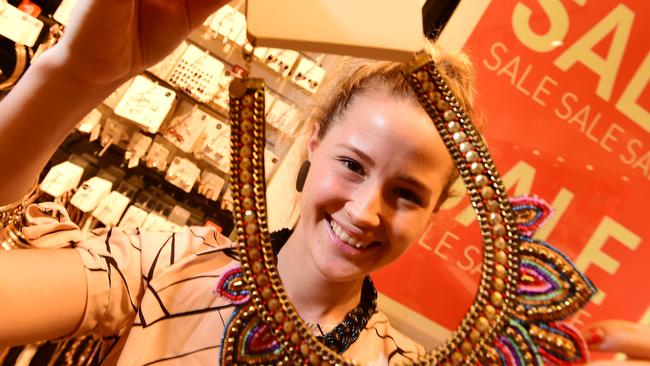
Supratim Adhikari 12.07pm: Catapult jumps as earnings turn
ASX-listed sports technology outfit Catapult Group’s shares have jumped 12 per cent after it posted its first positive EBITDA of $4.1 million in financial year 2019.
Catapult shares were up 12.81 per cent in afternoon trading at $1.36, with the company’s full year numbers buoyed by a combination of stronger sales and lower operating expenses, with revenue for the full year to June 30, up 24 per cent to $95.4m.
Annual recurring revenue for the period was also 24 per cent higher to $66.1m, while operating expense growth was reduced from 14 per cent to 9 per cent (pro-forma basis).
The company recorded a net loss after tax of $12.3m, an improvement of 29 per cent, with executive chairman Dr. Adir Shiffman saying Catapult had all the hallmarks of a viable subscription software business.
“We are beginning to experience the scalability typical of a successful subscription software business, with expense growth falling whilst revenue growth accelerates.”
CAT shares last up 13.2pc to $1.37.
12.05pm: Imaging group lifts on profit surge
Health imaging company Pro Medicus is enjoying a solid bump on the Australian market after delivering a 91.9 per cent lift in profit.
The company announced today that its full-year after-tax profit was $19.1m. It also revealed that revenues were up in all its markets, including a 42.2 per cent lift in North America, 102.3 per cent in Europe and 30.2 per cent in Australia. The boost across its key regions saw annual revenue across the group rise 47.9 per cent to $50.1 million.
Shares in the company, which were sitting at $7.64 just over a year ago, are up 13 per cent at $29.80 on news of the results.
Pro Medicus highlighted in its results that during the year it entered the S&P/ASX 200 index.
The company also signed three key contracts during the year, including a $27m deal in the US.
Ben Wilmot 11.54am: Cromwell finalises BNE’s biggest deal
The listed Cromwell Property Group has finalised the largest property investment in Brisbane this year, buying the complex a George Street office block from US private equity group Blackstone and German group HSBC Trinkaus for $524.75m.
The purchase in the city’s North Quarter precinct, comes as Brisbane’s commercial property market is on the rise with vacancy falling to 11.9 per cent.
Cromwell chief executive Paul Weightman, flagged more big deals, potentially including sales, noting its had recently sold its half stake in the $600 million Northpoint Tower in North Sydney.
Cromwell sold the interest in Northpoint Tower for $300m to Hong Kong group Early Light International and also raised $407.5m via an institutional placement and a security purchase plan.
11.43am: Gas market tight, but shortfall unlikely
Australia’s populous eastern seaboard is unlikely to be hit by a natural-gas shortfall next year, but the market remains tight and more development and production are needed, the country’s antitrust regulator said Thursday.
The Australian Competition and Consumer Commission said it finds the risk of a gas-supply shortage in 2020 is lower than for the current year, mainly thanks to a jump in output from producers on the east coast. It notes that the Energy Market Operator has forecast lower gas consumption for power generation over the coming year.
Still, ACCC chairman Rod Sims said high gas prices remain a concern for commercial and industrial users, particularly in southern states.
“What would most relieve price pressures is developing new low-cost supply in the southern states,” Mr. Sims said, following the release of the commission’s latest report on the gas market.
He said the supply-demand balance remains tight and there is uncertainty about how much gas will be used for power generation and how much of what is produced will flow to Queensland, where three big liquefied natural gas projects export to Asia.
Dow Jones Newswires
Sarah-Jane Tasker 11.39am: Regis blames inquiry for occupancy slip
Regis Healthcare’s profit has slumped 17 per cent as it warns occupancy was hit by negative sentiment towards aged care following the royal commission review into the sector.
Ross Johnston, managing director of Regis, said earnings contributions the company had gained from growth projects over the year were more than offset by headwinds from several factors.
He said the headwinds included the continued impact of Federal Government cutbacks to residential Aged Care funding, which were implemented in 20117 and 2018 and have been grandfathering in.
“This was despite the $10.8m received in the second half of the period as a result of the Federal Government additional funding boost,” he said.
The Regis chief added that the aged care industry was also experiencing occupancy headwinds due to public sentiment towards aged care and negativity fuelled by the Aged Care Royal Commission.
REG last down 0.35pc to $2.87.
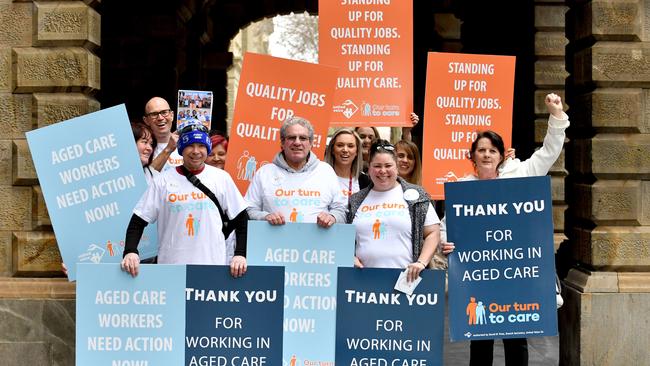
Ben Wilmot 11.34am: Scentre Group facing tough retail market
Local Westfield owner Scentre Group has kept its underlying earnings on track but is facing a tough retail environment where it believes it is taking market share off smaller rivals.
The group was on track to deliver Funds From Operations growth of 3 per cent, although once its recent sales of Westfield Burwood and the towers above and around Westfield Sydney are accounted for, this comes back to 0.7 per cent.
But the group’s investors could also reap the expected positive earnings impact of a buy-back program of up to $800 million and the sales have kept on track although tenants are under pressure from sluggish consumer sentiment.
In a busy half, Scentre had steady retail sales but was hit by a further deterioration in re-leasing spreads and had solid net operating income growth at 2.3 per cent.
Scentre chief executive Peter Allen is looking to position the group as the best platform for retailers looking for both a physical and online presence and noted Westfield centres had annual customer visitation running at more than 535 million.
Mr Allen said retailers were saying they haven’t really seen the government stimulus flow through but sales in Westfield centres had risen by 2 per cent in July, which suggested it was out-performing the market as retail spending numbers from the NAB were just 0.1 per cent.
Shares in the company are off by 0.8pc to $3.82.
Sarah-Jane Tasker 11.05am: Ruralco edges up on ACCC approval
Shares in Ruralco are higher by 2.8 per cent after the competition regulator today gave the all clear for its takeover by Canadian group Nutrien.
The Australian Competition and Consumer Commission said today its approval was subject to Nutrien, which owns Landmark in Australia, selling three rural merchandise stores in Broome in Western Australia, Alice Springs in the Northern Territory and at Hughenden in Queensland, to a purchaser approved by the regulator.
The transaction still needs approval from the Australian Foreign Investment Review Board.
The Australian-listed Ruralco revealed in February that its board had backed Nutrien’s offer, which was for $4.40 a share. When the deal was announced the company said it was a 44 per cent premium on its one-month average stock price.
When combined, Landmark and Ruralco will own 20 to 25 per cent of rural merchandise stores and will provide wholesale supplies to many other sites.
10.57am: South32 ‘softer than expected’: RBC
South32’s result was “slightly softer than expected” on an underlying basis and this flowed through to the final dividend, notes RBC’s Head of Equities, Karen Jorritsma.
The top-up to the capital management program—to be completed over the next 12 months, most likely via a share buyback in our view—is “positive”.
But the cost outlook appears “softer than our estimates”, though generally flat year-on-year across key business units.
“The key item of note was the update on SAEC: the resulting impairment charge in the FY19 results assumes that transaction approvals are fulfilled by June 2020,” Ms Jorritsma says.
RBC has a Sector Perform and a $3.40 price target on the stock.
South32 shares are down 0.36pc to $2.74 early.
Eli Greenblat 10.51am: Coles payout excites investors
Shares in Coles were up nearly 5 per cent after it reported a 9.1 per cent slide in its full-year net profit to $1.434 billion but a surprise of a special dividend to take its final dividend to 35.5 cents per share.
Coles said this morning that its earnings from ongoing operations, excluding the sale of its hotels business and the petrol deal with Viva, was $1.325 billion which is down 8.1 per cent and above analysts consensus forecasts.
UBS analysts say the result was largely in line with consensus, growth in the current year would be harder to come by.
“While Little Shop 2 has resonated with customers – 1Q20 is cycling a tough competition. In Express, growth in fuel volumes has been encouraging following a more competitive fuel pricing – but will take time to build to target levels and expects earnings growth to remain subdued in FY20,” UBS says.
“Smarter selling initiatives anticipated to deliver annualised benefits in excess of $150m in FY20.”
Shares in Coles were this morning up 53 cents, or 4 per cent, at $13.77 and were as high as $13.84 in early trade.
Cliona O’Dowd 10.48am: Zip Co targeting $2bn sales volume
Zip Co is targeting more than $2 billion in sales volume in the coming year and says it is exploring new market opportunities as part of its global expansion, as the credit card disrupter revealed it halved its full year loss in the last financial year.
For the 12 months through June, the buy-now, pay-later operator posted a loss of $11.1 million, down from a loss of $22.5m the year prior, on revenue of $84.2m.
The volume of sales that went through its system more than doubled to $1.13bn as the number of customers on its platform surged to 1.3 million.
“We are proud of these results, but are only just beginning and are now well positioned to drive more customers to transact at more places, more often,” Zip chief executive Larry Diamond said.
“We have a number of strategies in place to execute, both locally and globally, and are genuinely excited by the opportunities that lie ahead,” he added.
Customer receivables rose to $682.6m in the year, up from $316.7m the year prior, while both arrears and bad debts remained broadly static.
10.32am: How reporting companies fared early
Today is the busiest day on the earnings calendar, with more reports in just one day than the next week combined.
Here’s how key reporting companies are faring in early trade:
- Qantas edging higher by 0.35pc to $5.80 after profit slipped by 17pc while announcing a $400m buyback
- Coles is higher by 4.4pc to $13.82 after a sales and profit slip, investors instead focussing on its special dividend
- Medibank up by 2pc to $3.45 as it increased its profit and announced a special dividend
- Nine Entertainment is higher by 3.9pc to $1.88 after the merger with Fairfax helped its bottom line
- Coca-Cola Amatil edging up 4.2pc to $10.88 despite a slip in Australian beverage sales as it declared a special dividend from the proceeds of its SPC sale
- Origin rising by 4pc to $7.50 on surging profits
- Santos higher by 3.9pc to $7.13 after trippling interim profit as LNG prices continue to climb
- Perpetual taking a 3.9pc hit to $34.95, warning its value strategy was hurting its results
- Webject is tumbling by 10.76pc to $12.36 despite flagging strength for the start of the new year
- South32 off by 0.18pc to $2.75 after flagging the sale of its coal arm
- Scentre Group lower by 0.78pc to $3.82 as the mall-owner feels the amazon effect
10.28am: Stocks jump amid earnings strength
The local market jumped as much as 0.5 per cent at the open, as strong earnings drive market positivity.
It comes after a rebound on Wall St overnight, but largely thanks to strength in energy stocks after bumper results from Origin and Santos, alongside a boost across the tech sector.
The benchmark ASX200 is trading higher by 28 points or 0.43 per cent to 6511.1 in the first half hour.
Its not all good news, Qantas is slipping by 0.26 per cent after a drop in profits.
10.13am: Coca-Cola Amatil trends improving: Citi
Coca-Cola Amatil results shows some signs of improving revenue trends and may increase investor confidence that the company can return to EPS growth in FY20, according to Citi.
While first half earnings of $290 million fell 3 per cent and excluding lease accounting changes fell 5pc, CCL reported a more moderate decline in Australian beverage volumes and good volume growth in Indonesia, while NZ and Alcohol continue to performed well, Citi says.
Australian volume trends improved, with volumes down 1.2pc in 1H versus a 2H18 decline of 2.2pc, and Indonesia volumes rebounded to be up 10pc with pricing up slightly, though the margin in Indonesia fell by 140bp due to higher marketing and FX driven costs.
Citi expects upgrades of 1-3pc to consensus for FY19.
CCl shares are up 4.7pc at $10.93 in early trading.
John Stensholt 10.12am: Bingo hits record earnings on DADI buy
Bingo Industries’ $577 million acquisition of Ian Malouf’s Dial-a-Dump Industries has helped the waste management business record group underlying EBITDA of $106.1 million.
The result, which Bingo said was in line with previous market guidance, was up 13.2 per cent from 2018 and included $13.6 million contribution from DADI, which Bingo completed its deal for in March.
Underlying net profit after tax was $58.9 million, up 22.2 per cent from the previous year, while revenue rose 32.4 per cent to $402.2 million.
“The acquisition of DADI has materially changed our business and we’ve made great progress since completion,” Bingo chief executive Daniel Tartak told the market. “The asset base we’ve secured through the acquisition will help transform our business for many years to come.”
Bingo said it expected its underlying EBITDA margin, which fell 4.4 per cent to 26.4 per cent, to recover in future years with a full contribution from DADI and development programs at its existing recycling and landfill centres.
Statutory net profit fell 41.1 per cent to $22.3 million, though the result came after $18.9 million transaction and integration costs related to the DADI transaction and $14.8 million worth of stamp duty.
Bingo declared a final dividend of 2c per share, payable on December 30.
Robyn Ironside 10.09am: Qantas unveils $400m buyback
As well a fully franked dividend of 13 cents a share, Qantas this morning announced an off market buyback of up to 79.7 million shares worth about $400 million based on yesterday’s share price of $5.78 a share.
Mr Joyce said the latest buyback would bring the total reduction in shares on issue to nearly one third - the most of any company on the ASX in the past five years.
“That improves our earnings per share significantly, and our strong financial performance means our customers will notice more improvements in the next 12-months,” he said.
These would include the complete refurbishment of Qantas’s 12 Airbus A380 fleet, with the first revamped superjumbo to return to service next month.
The airline was also expecting to take delivery of another six new 787-9s from October, taking the total Dreamliner fleet to 14 aircraft.
QAN shares opened 2pc higher to $5.90, last up 0.43pc at $5.80.
10.02am: Origin results ‘marginally positive”: RBC
Origin Energy’s results and guidance “should be viewed marginally positively” by the market, according to RBC analyst Ben Wilson
“Despite key FY20 Energy Markets guidance falling a little short of our standing forecast, we think expectations were a bit lower,” he says.
While the FY19 final dividend was a positive surprise — 5cps better than forecast — he says the forward target of 30-50pc of free cash flow is “a little lighter than our standing assumption of 60pc of net income”.
“We note, however, the likelihood that Ironbark sale proceeds of $230m will be included in the FCF definition for FY20 dividend which boosts our like-for-like forecast range to a level that contains our standing 44cps assumption.”
RBC has an Outperform rating and $9.50 target. ORG last $7.20.
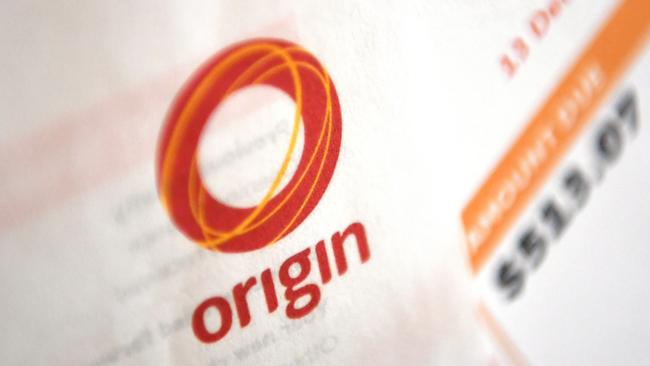
9.54am: Santos beats RBC expectations
Santos reported a “strong result”, with first half beating RBC’s expectation by 10 per cent at the EBITDA level attributable most notably to a $50 million inventory stock movement and higher than forecast other revenues from external customers, says analyst Ben Wilson.
The dividend of US6 cents per share also beat his US5cps estimate, but with higher cash flows it was in line with his expectation for a 20pc payout of free cash flow.
He notes that guidance remained largely unchanged with the only change a lowering of capex guidance by $US100m at the midpoint.
Deferral of the McArthur Basin drilling program into 2020 wasn’t a surprise given the delays encountered in recent weeks on the Dukas well.
Mr Wilson has an Outperform rating and $8.00 target. STO last $6.86.
9.48am: 7-week iron ore tumble continues
The seven-week tumble in iron ore prices continued overnight with spot down 6.2 per cent to $US83.00 a tonne — 35 per cent below its July 3 peak.
Singapore futures fell almost 10pc to a 7-month low of $US77.84 last night, while Dalian fell 3.7pc.
Iron ore price falls could weigh on iron ore miners again with BHP ADR’s equivalent close at $35.11 implying a 0.4pc fall in the market heavyweight, even as futures point to a 0.5pc rise in the ASX200.
Commonwealth Bank says the sharp fall in prices yesterday came as lower steel prices discouraged steel mills in China to purchase the steelmaking ingredient.
“Steel prices fell on concerns that demand will weaken further in the upcoming holiday season in China,” says CBA commodity analyst Vivek Dhar.
“Market participants noted that lower iron ore prices haven’t encouraged stronger demand yet because of low steel mill margins.”
He also notes that The World Steel Association echoed concerns over China’s steel demand.
It expects China’s steel demand will grow only 1 per cent this year, before falling 1 per cent in 2020.
“The group noted that downside risks to China’s steel demand are driven by political uncertainties,” Mr Dhar says.
Andrew White 9.37am: Value strategy dents Perpetual results
Perpetual reported a 17 per cent drop in annual net profit to $115.9 million as it battled financial sector disruption and poor returns, outflows and lower performance fees in its core funds management business.
Revenue fell 4 per cent to $514.1 million.
The total dividend of $2.50 a share is 9 per cent lower than the 2017-18 year but represented a 100 per cent payout of net profit.
Chief executive Rob Adams said Perpetual had been hit by market uncertainty and a challenging operating environment.
Profit before tax in the core funds management business Perpetual Investments fell 29 per cent to $79.9 million, after a decrease in revenue due to lower average funds under management and lower performance fees.
“The business was challenged by market uncertainty combined with fund outflows experienced throughout the year,” Mr Adam said.
“It was also impacted by prolonged low volatility, record low interest rates, and an extended market cycle favouring passive and growth investment styles meaning our value style underperformed when compared to the broader peer group,” Mr Adam said.
Still, the unit raised the maximum $440 million for the new Perpetual Credit Income Trust, and an additional $101 million for the Perpetual Equity Investment Company
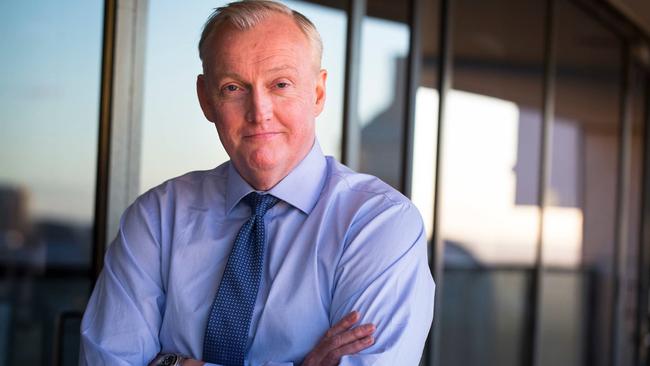
Perry Williams 9.36am: Santos triples first half profit
Energy operator Santos posted a tripling in first half net profit on higher output and LNG prices and the integration of Western Australian gas producer Quadrant Energy.
Net profit rose to $US388 million ($571m) for the first six months to June 30 — beating a $US367m forecast from RBC — and compared to $US104m in the same period last year.
Underlying profit rose 89 per cent to $US411m underpinned by a 18 per cent lift in product sales to $US1.97bn.
The interim dividend payout also jumped 71 per cent to US6c per share from US3.5c per share with net debt falling to $US3.35bn.
Santos’ capital spending for 2019 was lowered to a $US950m to $US1.05bn range from a prior $US1.1bn target.
The company is targeting final investment decisions on Barossa and also says it is looking to cement a deal on the P’nyang LNG expansion in Papua New Guinea with partners including Oil Search.
Supratim Adhikari 9.27am: Vocus hopeful of turnaround progress
Vocus Group is starting to make some progress in its three-year turnaround strategy, with Australia’s fourth-biggest telco confident it can add to its bottom line in financial year 2020.
The telco has posted underlying net profit to $105.5 million for full year 2019, down 17 per cent on the prior year, with revenue for the period fat at $1.89 billion. Underlying earnings before interest, tax, depreciation and amortisation (EBITDA) slipped 2 per cent to $360.1m.
The FY19 results were in line with previous guidance provided by Vocus, with the growth in telco’s core infrastructure business undermined by the ongoing weakness in its retail broadband business.
According to Vocus, things were starting to improve for the retail business, which includes Dodo and iPrimus.
While the retail business saw a 15 per cent decline in revenues, margins edged up 1.8 per cent in the full year due to its digital transformation program, operating cost efficiencies, and improved supplier terms.
“The revenue headwinds from the reduction in PSTN Voice services across the market and the continuing migration to low-margin NBN services are reducing as the NBN roll out progresses,” it said.
9.19am: Ruralco, Nutrien get ACCC green light
Canadian-based Nutrien has been given the green light from the competition regulator, paving the way for its $469 million takeover of agricultural services group Ruralco.
In a statement this morning, the Australian Competition and Consumer Commission said it will not oppose the deal, conditional on Nutrien divesting three rural merchandise stores in Broome, Alice Springs and Hughenden to a purchaser approved by the ACCC.
“Ultimately, we decided that the transaction was not likely to substantially lessen competition, as rival rural merchandise retailers and wholesalers will continue to provide strong competition,” ACCC Deputy Chair Mick Keogh said.
“The independent sector in rural merchandise is strong, and we considered that it is likely to remain strong, due to the close relationship that independent store owners can build with their local farmer customers.”
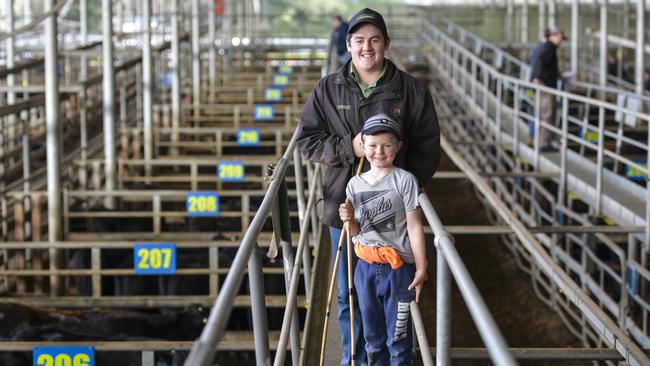
9.13am: What’s impressing analysts, what’s not
- APN Industria REIT raised to Positive — Evans & Partners
- BHP PLC raised to Hold — SBG Securities
- Bapcor cut to Hold — Morgans Financial
- Blackmores cut to Hold — Morningstar
- Brambles cut to Underperform — Credit Suisse
- Brambles cut to Neutral — UBS
- Brambles raised to Hold — Morningstar
- Brambles target price cut 8.8pc to $11.40; Equalweight retained — Morgan Stanley
- Charter Hall Retail raised to Hold — Moelis & Company
- Domino’s Pizza Enterprises raised to Neutral — Credit Suisse
- Emeco cut to Accumulate — Hartleys Ltd
- GWA Group raised to Hold — Morningstar
- Iluka cut to Hold — Shaw and Partners
- Johns Lyng restarted at Buy — Bell Potter
- Nearmap raised to Outperform — RBC
- Orora raised to Hold — Morningstar
- Saracen Mineral raised to Accumulate — Hartleys
- Steadfast raised to Overweight — JPMorgan
- Stockland cut Sell — Morningstar
- St Barbara cut to Sell — Citi
- Virtus Health cut to Equal-weight — Morgan Stanley
- WiseTech raised to Positive — Evans & Partners
- Stockland cut to Neutral — Macquarie
Samantha Bailey 9.09am: Downer EDI boosted in resources recovery
Engineering and contracting group Downer EDI has delivered an after tax profit up 266.7 per cent on the prior year to $261.8 million.
The company declared a final dividend of 14 cents per share 50 per cent franked, in line with last year.
“Our Urban Services businesses — Transport, Utilities and Facilities — are continuing to grow and there is a strong pipeline of opportunities across all the markets in which we operate,” chief executive Grant Fenn said.
“There has been a recovery in the mining and resources sector over the past 12 months and this drove revenue growth for our Mining, Energy and Industrials businesses.”
9.07am: ASX to edge higher in results avalanche
Australia’s sharemarket is set to open higher as earnings season peaks with 21 of the top 200 companies reporting today.
Overnight futures relative to estimated fair value suggest the S&P/ASX 200 will open up 0.5pc at 6515 — near the middle of the 6466.6-6545 range of the past two days.
After an early rise in response to offshore gains the market will await US and EU PMI data tonight and Fed Chair Jerome Powell’s Jay Powell’s Jackson Hole speech on Friday.
Domain, JB Hi-Fi, Newcrest and QBE trade ex-dividend today.
Eli Greenblat 8.57am: Coles posts 3rd straight earnings slide
Supermarket giant Coles has unveiled a 9.1 per cent slide in its full-year net profit to $1.434 billion as sales across its retail arms shrank by 1.7 per cent to $38,464 billion, with the retailer ringing up its third consecutive decline in earnings and its slimmest sales result since 2015.
However there was some good news for investors with Coles in its first year as a an independent public company following the demerger from parent Wesfarmers late last year issued a special dividend to shareholders.
Coles this morning said it would pay a total dividend of 35.5 cents per share, made up of a final dividend of 24 cents per share and a special dividend of 11.5 cents per share.
Coles announced this morning that total sales hit $38.46 billion, its thinnest sales performance since 2015. Earnings before interest and tax of $1.466 billion, down 0.9 per cent, was the third year in a row that earnings had fallen and the smallest earnings result in more than six years.
The retailer said the growth in supermarkets and liquor was offset by lower sales revenue in Coles Express driven by a decline in fuel volumes and the move to a commission agent model under the New Alliance petrol sites agreement, effective from March. Under the new Coles no longer recognises fuel sales revenue however is entitled to commission from fuel sold at Alliance sites.
The full-year result also includes provisions of $145.8 million linked to redundancies and lease exit costs for a number of its distribution centres.
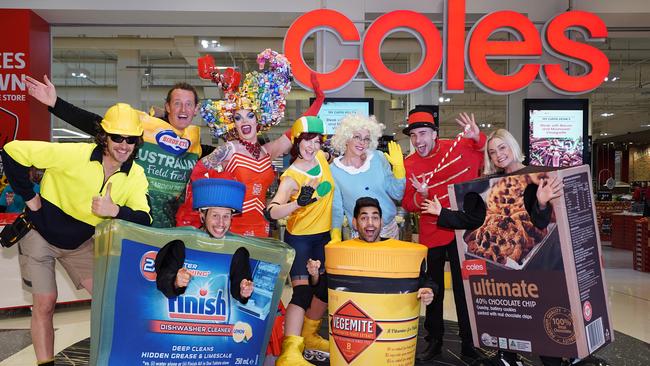
Perry Williams 8.56am: Origin profit jumps fivefold
Origin Energy has delivered a fivefold rise in annual profit as strong earnings from its Queensland LNG business offset a fall in its core energy markets unit.
Bottom line earnings surged to $1.211 billion for the 2019 financial year, just short of a $1.259bn consensus forecast, and compared to $280m in the prior year.
Underlying profit rose to $1.028bn and the Australia Pacific LNG unit delivered net cash flow of $943m to Origin.
The closely watched Energy Markets unit saw underlying earnings before interest, tax, depreciation and amortisation fall by five per cent to $1.574bn in line with a $1.5bn to $1.6bn forecast previously guided by the Sydney-based company.
However, Origin expects underlying EBITDA for energy markets to decline to $1.35bn to $1.45bn in the 2020 financial year highlighting the headwinds major power companies face from the government imposed default market offer, lower green scheme prices and falling customer use of power.
Zoe Samios 8.55am: Southern Cross TV writedowns weigh
Southern Cross Austereo has swung to a net loss of $91.3 million, hit by impairment charges against its television assets, a value loss on assets for sale, and a slow advertising market.
However, the media company, which owns audio and television assets including the Hit and Triple M radio networks, revenue climbed 0.5 per cent for the full year, to $660.088 million.
An impairment loss of $226.9 million against television licences and value loss on the transmission assets sold for $9.2 million to Broadcast Australia were the main reasons for the profit fall.
Revenue growth was driven by the audio sector, up 2.4 per cent to $452.424 million. It comes despite SCA making the decision last week to axe the breakfast show of struggling Sydney station 2DayFM, after years of declining ratings.
Television was impacted by a slow advertising market, down 3.2 per cent to $206.558 million.
Southern Cross Austereo chief executive Grant Blackley said audio growth was due to the decision to package FM and digital radio reach for advertisers into a single proposition.
8.54am: Scentre profit halves
Australian mall owner Scentre Group on Thursday said its half-year net profit fell by 49 per cent.
Scentre, which owns and operates nearly 40 Westfield branded shopping centres, reported a net profit of $740 in the six months through June. That was down from $1.46 billion at the same stage of the previous year.
Funds from operations — a smoothed measure of operating cash flow that excludes depreciation, amortisation and gains on asset sales — rose by 2.9 per cent to $676.2 million in the six-month period.
Dow Jones

Samantha Bailey 8.46am: Webjet upbeat with M&A plans
Webjet has told the market that the first six weeks of trading has shown a strong start to the new financial year and touted a strong pipeline of acquisition opportunities for the year ahead.
The company unveiled an after tax profit attributable to members up 45 per cent to $60.3 million as it declared a fully franked final dividend of 13.5 cents per share, bringing the total dividend for the year to 22 cents up 10 per cent on the prior year.
“The outlook for travel remains positive, notwithstanding the uncertainties caused by factors we cannot control such as a global trade war, Brexit, climactic events and perceptions of over-tourism,” chairman Roger Sharp said.
“While we see the world as an increasingly more complex environment in which to operate a large travel business, we also continue to see significant areas for profitable growth across both our WebBeds and B2C businesses.”
Perry Williams 8.45am: Shell jumps on ERM Power for $617m
Global energy giant Royal Dutch Shell has pounced on Trevor St Baker’s ERM Power in a $617 million deal.
Shell has proposed to pay ERM $2.465 per share in a scheme of implementation deal that signals Shell’s intentions to challenge the big three incumbents: AGL Energy, Origin Energy and EnergyAustralia.
ERM, listed on the Australian Securities Exchange, has recommended the deal. Mr St Baker has a 25 per cent stake in the company he founded.
Lilly Vitorovich 8.42am: Merger drives Nine profit
Nine Entertainment has reported an increase in annual profit, driven by its $4 billion merger with Fairfax Media.
Profit after tax from continuing operations rose 3 per cent to $216.6 million for the year to June, with a final dividend of 5 cents a share.
Samantha Bailey 8.40am: Flight Centre looks overseas for growth
Travel group Flight Centre has flagged an improvement in the local travel market for the year ahead as it delivered a net profit up 0.1 per cent due to strength in its overseas businesses and corporate travel earnings partly offsetting subdued Australian results.
“Our overseas businesses have become strong and consistent performers and, for the first time, generated the majority of our profit during fiscal year 2019,” managing director Graham Turner said.
“We expect this trend to continue, given our success and relatively small share of very large markets overseas.
“The Americas business is now entrenched as a key earnings driver, with expectations of strong growth into the future.”
The company unveiled a net profit after tax attributable to shareholders up 0.1 per cent to $263.83 million for the year through June.
Flight Centre declared a final dividend of 98 cents per share fully-franked, down from $1.07 a year ago.
Eli Greenblat 8.37am: Coke posts rebound
Coca-Cola Amatil has posted a 6.3 per cent rebound in its interim profit to $168 million, driven by a 5.2 per cent lift in half year sales to $2.406 billion as its core Australian soft drinks and beverages division delivered a fall in earnings but this was countered by growth in New Zealand, Fiji, Indonesia and from its alcohol and coffee businesses.
Its core Australian beverages arm suffered a 8.3 per cent fall in earnings to $161.6 million as volumes fell slightly to $1.215 billion.
Coca Cola Amatil announced an interim dividend of 25 cents per share, comprising of a 21 cents per share dividend and a special dividend of 4 cents per share following the sale of its SPC business.
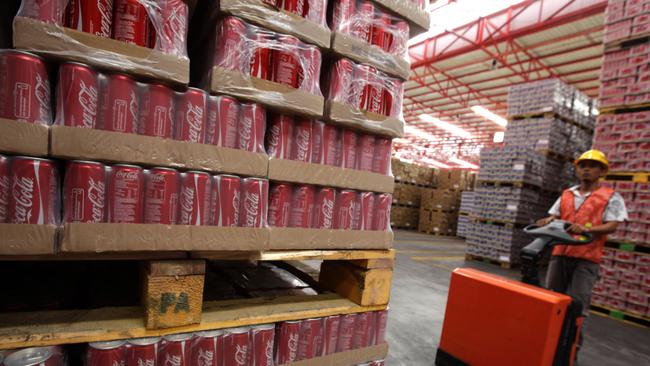
Robyn Ironside 8.36am: Slow demand, fuel costs hit Qantas
Sluggish demand for travel and soaring fuel costs have made a dent in Qantas’s bottom line, with the airline group posting a 17 per cent drop in before tax profits to $1.3 billion.
Net profit fell 6.5 per cent or $62 million to $891 million as a result of a big jump in fuel and the weakening demand.
Despite capacity discipline, even the strongest performing part of the business, Qantas Domestic., saw a 4 per cent fall in underlying earnings before interest and tax of $1.03 billion.
Qantas Group CEO Alan Joyce said given the mixed market conditions, the 2019 financial year performance was “particularly positive”.
“This result shows the strength of our individual businesses but also the strength of our portfolio as whole,” Mr Joyce said.
“Even with headwinds like fuel costs and foreign exchange, we remain one of the best performing airline groups in the world.”
Chris Jenkins 8.33am: Qantas underlying profit falls 17pc
Qantas has reported record revenue but underlying profit before tax of $1.3 billion, down 17 per cent.
“While the underlying result was 17 per cent lower compared with the group’s record profit in FY18, it was impacted by an $614 million increase in fuel costs from higher oil price,” the airline said in a statement to the ASX.
“This result shows the strength of our individual businesses but also the strength of our portfolio as a whole.
“Even with headwinds like fuel costs and foreign exchange, we remain one of the best performing airline groups in the world, CEO Alan Joyce said.
“Our performance is the result of having the right strategy and the ability to deliver it.”
Samantha Bailey 8.30am: Mortgage Choice profit falls 40pc
Mortgage Choice has delivered a cash net profit after tax down 40 per cent to $14 million for the full-year through June, resulting from the change in broker payouts as well as a fall in annual settlements due to the external lending environment.
“Tightening credit conditions, easing of property markets and economic uncertainty surrounding the royal commission and federal election had a combined effect to slow settlement activity across the business,” the company told the market this morning.
“We also saw the withdrawal of our white label home loans partner mid-year.”
Reported net profit after tax grew 223.9 per cent to $13.72m, but that figure was not comparable to the prior year, which included a one-off adjustment to reflect the retroactive nature of the change in the broker payout of more than $28m.
The company declared a final dividend of 9 cents a share fully franked, in line with last year.
Eli Greenblat 8.27am: Reject Shop posts loss
Struggling discount retailer The Reject Shop has posted a net loss of $16.9 million, a complete turnaround from the $16.6 million profit made in 2018, as impairments of $15.4 million after tax and a further slip in full-year sales savaged the company’s profitability.
Suffering a string of profit warnings over the last few years and the exit of its chief executive, The Reject Shop posted a 0.8 per cent fall in its sales for fiscal 2019 as pre-tax earnings fell by 57.6 per cent to $18.2 million. Its net earnings before the impairments was a loss of $1.5 million.
The company also said this morning it had breached its banking covenants.
A search for a new CEO is ongoing and the The Reject Shop chairman has announced he will resign at the AGM in October.
That loss was within guidance of a loss of $1 million to $2 million detailed to the market in May.
The company has announced a non-cash impairment charge of $21.9 million.
Supratim Adhikari 8.25am: McManus joins Deliveroo
Meridian Energy and Powershop Australia boss Ed McManus is ditching the energy sector to take charge of food delivery outfit Deliveroo’s Australian arm.
Mr McManus, who has also held leadership roles at REA Group and GlaxoSmithKline, will replace Levi Aron who stepped down as country manager in July.
Mr McManus will join former REA boss Greg Ellis as a star recruit for Deliveroo, with the business looking to scale up its business.
Mr Ellis joined the company as a senior adviser in July.
Deliveroo has 11,000 restaurants across 13 Australian cities on its platform, with 8000 delivery riders on its books.
In April it launched the “Deliveroo Plus” subscription service which gives users unlimited free delivery once they sign up to the platform.
The company is also taking steps to keep its delivery riders happier. It recently launched “Cash Out”, which allows rider to pick up their earnings within 24 hours instead of waiting a fortnight.
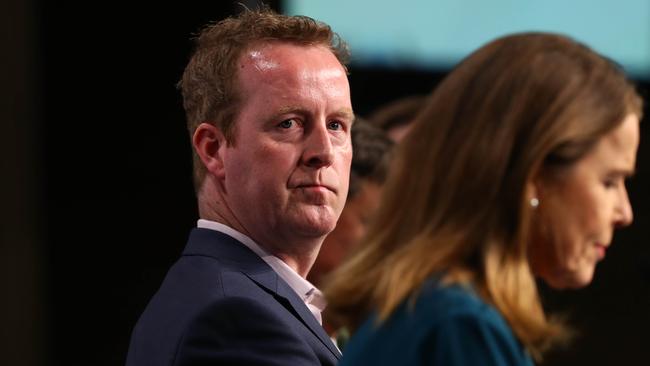
Samantha Bailey 8.20am: Yancoal lifts profit
Chinese-backed coal miner Yancoal delivered a net profit after tax up 56 per cent to $564 million for the half-year through June 30 and reaffirmed its full-year guidance after the market closed yesterday.
Before non-recurring items, which includes expenditure or income from restructuring costs and impairments of cash-generating units, net profit after tax fell 7 per cent to $345m.
“Coal remains a critical part of global baseload energy supply, and Yancoal is an integral part of the solution to satisfy the ongoing international demand for high-quality coal,” chief executive Reinhold Schmidt said.
“In response to market conditions impacting the realised price we achieved in the latter months of the first half, we are focused on optimising our sales mix and volumes for the current international market.”
Operating earnings before interest, tax, depreciation and amortisation for the first half was $940m, down from $980m last year, partly due to an increase in stockpiled volumes over the half year.
The company declared an interim dividend of 10.35 cents per share unfranked, in line with last year.
8.10am: Medibank announces special dividend
Medibank Private plans to hand out a special dividend to shareholders after logging a modest rise in annual profit.
Net profit increased by 3.1 per cent to $458.7 million in the 12 months through June from $445.1 million a year earlier, the private health insurer said.
Health insurance premium revenue for the year was 2.4 per cent higher at $6.47 billion and revenue from its Medibank Health unit jumped 24 per cent to $185.1 million.
Investment income for the year was 1.0 per cent higher at $1.1 million.
It declared a final dividend of 7.4 cents per share and a special dividend of 2.5c.
8.04am: South32 selling South African coal business
South32 says it’s in negotiations with Seriti Resources over its offer to buy the miner’s South Africa Energy Coal business.
South32 says Seriti’s offer includes a modest upfront cash payment with a deferred payment mechanism whereby both companies will share commodity price upside for an agreed period. The offer is subject to final negotiations and execution of a binding agreement.
South32 also announced that given Seriti’s offer and the outlook for thermal coal, it would recognise a pre-tax, impairment charge of $US504m.
7.40am: Air NZ profit sinks 31pc
Air New Zealand has posted a sharp fall in net profit amid higher fuel prices and weakening demand.
The carrier said full year net profit of $NZ270 million was down 31 per cent on the previous year.
Operating revenue rose 5.3 per cent to $NZ5.8 billion, and earnings before tax fell 31 per cent to $NZ374m. Operating cash flow was $NZ986m, down 4.4 per cent.
Admitting “disappointment” with the result, chairman Tony Carter said the fact was the airline was operating in a different demand environment than 12 months ago.
“When we first saw signs that demand was slowing, we took immediate steps to review our network, fleet and cost base, to position our airline for success in a lower growth environment,” Mr Carter said.
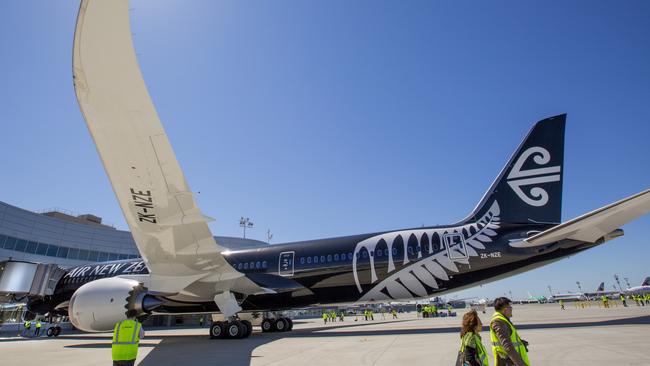
7.25am: Oil steadies
Oil futures steadied overnight after US government data showed a drawdown in domestic crude stocks but rises in refined product inventories, while lingering worries about the global economy weighed on the market.
Brent crude futures rose 27 US cents to settle at $US60.30 a barrel, down from a session high of $US61.41.
US West Texas Intermediate (WTI) crude fell 45 US cents to settle at $US55.68 a barrel after hitting $US57.13 a barrel.
Reuters
7.10am: Trump backs away from tax cuts
President Trump backed away from pursuing some new tax cuts to bolster the US economy, a sharp reversal from a day earlier, when he had described several such measures the White House was contemplating.
“I’m not looking at a tax cut now,” Mr. Trump told reporters on the South Lawn of the White House after he was asked whether he would pursue a proposal to cut payroll taxes. “We don’t need it. We have a strong economy.”
Mr Trump also dismissed another idea he floated a day earlier: lowering capital-gains taxes by indexing gains to inflation. “I’m not looking to do indexing,” he said. “I think it will be perceived, if I do it, as somewhat elitist … I want tax cuts for the middle class, the workers.” He added that it was an option, but “not something I love.”
On Tuesday, speaking to reporters in the Oval Office, the president said he had been “thinking about payroll taxes for a long time” and that indexing was “something I’m thinking about.” He added, “I would love to do something on capital gains.”
Dow Jones
7.05am: ASX expected to open higher
The Australian share market is expected to open higher as investors await a slew of corporate results.
At 7am (AEST) the SPI200 futures contract was up 27 points, or 0.42 per cent, at 6,466.0,
suggesting a positive start for the benchmark S&P/ASX200.
On Wall Street overnight, the Dow Jones Industrial Average finished up 0.93 per cent, the S&P 500 was up 0.82 per cent and the tech-heavy Nasdaq Composite was up 0.90 per cent.
The Aussie dollar is buying US67.81 cents from US67.76 cents on Wednesday.
AAP
6.50am: US stocks rise
Wall Street stocks resumed their upward climb, finishing solidly higher after solid retailer earnings and following Federal Reserve minutes that included no bombshells on monetary policy.
The gains came despite a brief inversion near the end of the session of yields on the two- and 10-year Treasury notes, a harbinger of past recessions and a trigger for a major sell-off earlier this month.
The Dow Jones Industrial Average rose 0.9 per cent to finish the day at 26,202.73, not moving significantly after the yield curve inversion.
The broadbased S&P 500 gained 0.8 per cent to close at 2,924.43, while the tech-rich Nasdaq Composite Index won 0.9 per cent to end at 8,020.21.
After yesterday’s losses, Australian stocks are tipped to rebound and open higher. At 6.45am (AEST) the SPI futures index was up 28 points.
On Wall Street, big box chains Target and Lowe’s reported higher profits on strong gains in comparable store sales, offering the latest confirmation that US consumers remain strong despite weakness in manufacturing and key overseas markets.
Target surged 20.4 per cent, while Lowe’s gained 10.4 per cent.
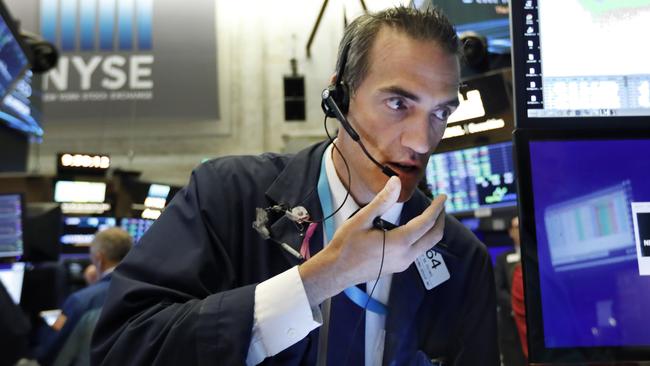
Minutes from the Fed’s July 31 meeting said the US central bank will remain flexible and interest rates will not be on a “preset course” in the face of persistent risks from trade uncertainty and weak global growth.
On July 31, policymakers cut the key interest rate for the first time in more than a decade, a move characterised in the minutes as “part of a recalibration … or mid-cycle adjustment.”
The minutes “didn’t dissuade investors from the concept that the Fed might be lined up to cut rates again at some point this year,” said Art Hogan chief market strategist at National Securities.
Among other stocks, Tesla fell 2.2 per cent after the company was sued by Walmart over fires from solar panels. Walmart was flat.
AFP
6.48am: Iron ore sinks again
The spot price of iron ore fell 6.2 per cent to $US83, according to CommSec.
6.45am: US retail divide
The divide between retail winners and losers is widening.
That became even more evident with the latest batch of US earnings reports: Big-box stores and off-price retailers have been responding faster to shoppers’ increasing shift online with expanded deliveries and better merchandise.
But many mall-based clothing chains and department stores continue to suffer weak sales as they struggle to lure in shoppers.
“There is an increasing polarisation in retail,” said Neil Saunders, managing director at Global Data Retail. “It’s a vicious cycle, and it’s difficult to pull out of the tail spin.”
In fact, for the first two fiscal quarters of this year, earnings at off-mall retailers rose 3 per cent, compared with a drop of 29 per cent for mall-based retailers, according to Retail Metrics, a retail research firm, which analysed results at 105 retailers.
6.40am: Rates not preset: Fed
The US Federal Reserve will remain flexible and interest rates will not be on a “preset course” in the face of persistent risks from trade uncertainty and weak global growth, the central bank said.
In its policy meeting late last month, when the Fed cut the benchmark interest rate for the first time in more than a decade, central bankers said they would keep their options open for the next move, amid fears the trade tensions could slow the US economy.
President Donald Trump’s trade war with Beijing has increased uncertainty and caused businesses to hold off on investments, at a time when China’s economy is slowing and Europe is facing the uncertainty of Brexit.
Those risks are expected to persist, and the “continued weakness in global economic growth and ongoing trade tensions had the potential to slow US economic activity,” according to the minutes of the Fed’s July 30-31 policy meeting.
After four rate increases last year — the last one in December — the Fed has been under relentless pressure from Trump to stimulate the economy by reversing course and slashing rates.
While the minutes made no mention of Trump’s constant attacks, Fed officials said they would be “guided by incoming information and its implications for the economic outlook and that avoided any appearance of following a preset course.”
The July rate cut was viewed as “part of a recalibration … or mid-cycle adjustment” and, given the uncertainty surrounding the outlook, the officials “highlighted the need for policymakers to remain flexible and focused on the implications of incoming data for the outlook.”
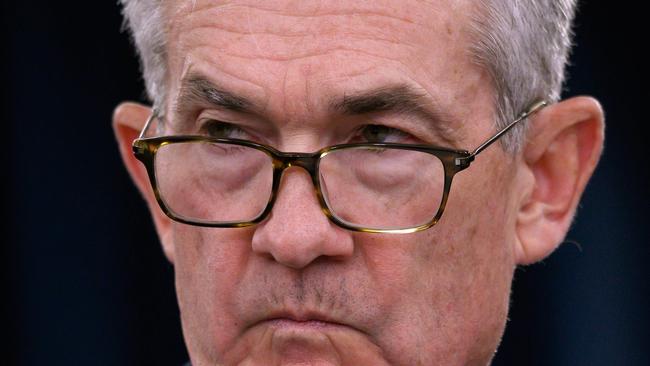
Fed chairman Jerome Powell acknowledged at his news conference on July 31 that the rate cut was meant as insurance “against downside risks from weak global growth and trade policy uncertainty, to help offset the effects these factors are having on the economy.”
And the minutes showed officials were “mindful” that trade tensions were far from settled and that trade uncertainties could intensify again.
They said continued weakness in the global economy remained a significant downside risk.
And with inflation stubbornly weak, the minutes noted that a slowing US economy would further delay a sustained return of inflation to the two per cent objective.
Fed officials expect US growth to slow in the second half of the year, but despite the risks to the outlook, they “continued to view a sustained expansion of economic activity, strong labour market conditions, and inflation near the committee’s symmetric two per cent objective as the most likely outcomes.”
The minutes showed the central bankers are not unified, however: two officials voted against cutting rates while a couple favoured a bigger cut.
AFP
6.35am: World stocks rise as recession fears fade
Stock markets mostly rose as investors appeared willing to set aside fears of recession, instead focusing on bargain hunting, analysts said.
They also seemed to largely shrug off political turmoil in Italy. “Recession nerves look to have settled a little following last week’s panic, which has brought some relief to markets,” said Craig Erlam at OANDA.
Global bond yields stabilised, indicating that markets are becoming less pessimistic about the outlook for the world economy.
Key European equity markets were more than one per cent higher by the close. That included Milan’s FTSE MIB index, which rallied as Italian President Sergio Mattarella began talks with key players in a bid to end political limbo in the eurozone’s number three economy.
The index had dived 1.1 per cent on Tuesday after the shock resignation of Prime Minister Giuseppe Conte.
“The markets have seemingly taken the latest political upheaval in Italy in their stride and are gaining,” noted XTB analyst David Cheetham.
In another sign that investors believe in rekindled growth down the road, the German treasury on Wednesday failed to sellout a 30-year zero-coupon government bond.
The treasury, which had hoped to place two billion euros of debt, in the end found takers for just 824 million. But those investors that did buy the bond paid over face value, taking the yield to -0.11 per cent, which means that they are paying the German government for the privilege of lending it money for the next three decades.
London closed up 1.1 per cent, Frankfurt ended 1.3 per cent higher and Paris finished up 1.7 per cent.
AFP
6.30am: US has fewer jobs than first reported
The US job market isn’t quite as strong as originally believed — with revised figures showing that the economy had 501,000 fewer total jobs this March than initially reported.
The Labor Department said that nearly two-thirds of the downward revision came from the retail and leisure and hospitality sectors, the industries most associated with consumer spending.
These preliminary revisions complicate the Trump administration’s message of a strong economy, as they suggest that job growth was slowing as the expansion approached its tenth anniversary. Some of this slowdown would be natural given the length of the expansion.
AP

6.25am: Trump renews attacks on Powell
President Donald Trump resumed his attacks on Federal Reserve Chair Jerome Powell, blaming him for keeping the economy from growing much faster.
In yet another Twitter screed, Trump said, “The only problem we have is Jay Powell and the Fed. He’s like a golfer who can’t putt, has no touch.”
Trump appointed Powell to his position, but repeatedly excoriated him for raising the key interest rate too quickly last year. He has called on the Fed to reverse all of those moves, cutting the rate by a full point, to help the economy and weaken the US dollar.
“Big U.S. growth if he does the right thing, BIG CUT — but don’t count on him! So far he has called it wrong, and only let us down,” he tweeted.
“Yesterday, ‘highest Dollar in USHistory.’ No inflation. Wake up Federal Reserve. Such growth potential, almost like never before!”
However, the International Monetary Fund in an unusually blunt blog post, said Trump’s tariffs and calls for lower interest rates to weaken the dollar won’t work and could slow the global economy.
AFP
.....We are competing with many countries that have a far lower interest rate, and we should be lower than them. Yesterday, “highest Dollar in U.S.History.†No inflation. Wake up Federal Reserve. Such growth potential, almost like never before!
— Donald J. Trump (@realDonaldTrump) August 21, 2019
6.20am: US home sales rise
US home sales increased 2.5 per cent in July, a sign that lower mortgage rates have produced a spurt of home-buying.
The National Association of Realtors says homes sold last month at a seasonally adjusted annualised rate of 5.42 million units.
Average interest rates on 30-year mortgages have fallen to 3.60 per cent, the lowest in nearly three years. Cheaper borrowing costs have enabled sales to rise 0.6 per cent from a year ago, ending 16 consecutive months of annual sales declines. Still, sales could be limited by a shortage of listings and home prices that are rising faster than incomes. The number of properties on the market has fallen 1.6 per cent during the past 12 months to 1.89 million units, giving buyers fewer options.
The median sales price climbed 4.3 per cent from a year ago to $US280,800.
AP
6.15am: IMF warns on US policy
US tariffs on China will not fix the trade deficit, and neither will weakening the US dollar through interest rate cuts, International Monetary Fund economists said Wednesday.
In unusually blunt language, the IMF warned that US President Donald Trump’s policy moves are counter-productive, won’t achieve the desired results, and will slow the global economy, IMF chief economist Gita Gopinath said in a blog titled “Taming the Currency Hype.” Instead, tariffs “are likely to harm both domestic and global growth by sapping business confidence and investment and disrupting global supply chains, while raising costs for producers and consumers.”
AFP
6.10am: Beijing appeals on trade
Beijing appealed to Washington on Wednesday to “meet China halfway” and end a tariff war after President Donald Trump said Americans might need to endure economic pain to achieve longer-term benefits.
A foreign ministry spokesman, Geng Shuang, expressed hope Washington can “get along us” and restore “mutually beneficial” trade.
The United States is pressing China to narrow its trade surplus and roll back plans for government-led development of global competitors in robotics and other technologies. Beijing’s trading partners say those plans violate its market- opening commitmentsSome American officials worry they might erode US industrial leadership.
Negotiations are deadlocked over how to enforce a deal. Beijing says punitive tariffs imposed by Trump on Chinese products must be lifted as soon as an agreement takes effect. Washington wants to keep some to ensure Beijing carries out any promises it makes.
AP



To join the conversation, please log in. Don't have an account? Register
Join the conversation, you are commenting as Logout